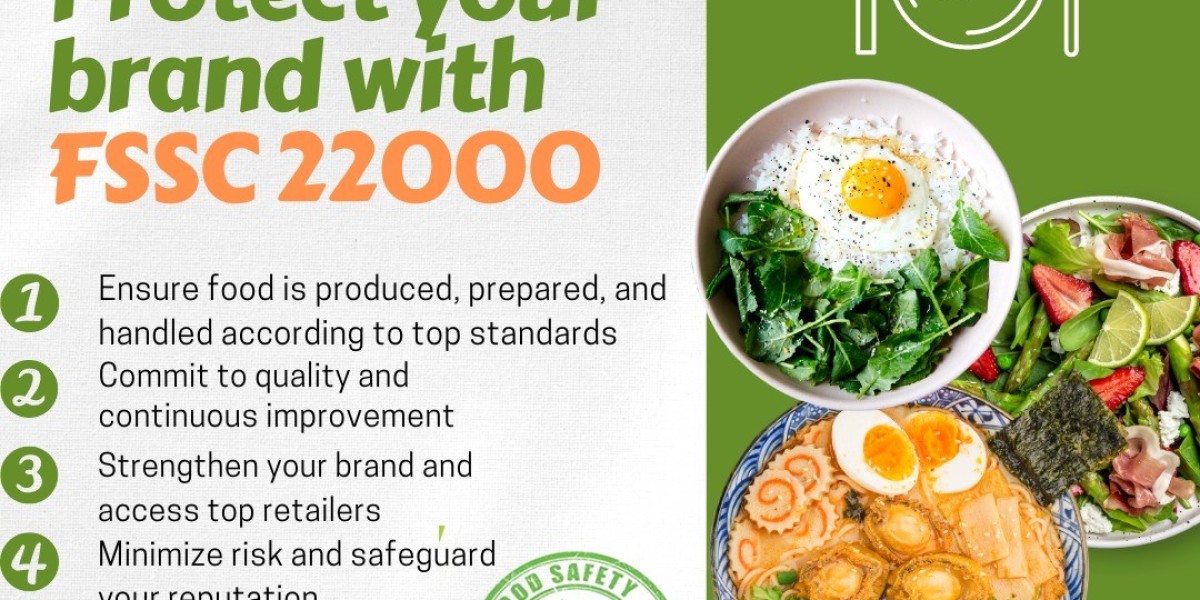What is FSSC 22000?
FSSC 22000 Certification in Singapore is a comprehensive food safety management system (FSMS) certification that combines the principles of ISO 22000 (the international standard for food safety management) with additional requirements based on ISO/TS 22002-1 (a prerequisite program for food safety). The certification helps food businesses ensure that their food safety management system is effective in identifying, preventing, and controlling food safety hazards.
FSSC 22000 is applicable to organizations across the food supply chain, including food manufacturers, distributors, packaging companies, and catering services, ensuring that food safety practices are integrated at every step of the production process. The certification provides a systematic approach to managing food safety risks and achieving continuous improvement, ultimately protecting consumer health and maintaining product quality.
Why FSSC 22000 Certification Matters in Singapore
Singapore has a strong reputation for maintaining high standards of food safety, largely due to its robust regulatory framework managed by the Singapore Food Agency (SFA). The country’s food safety regulations are aligned with global best practices, and businesses are expected to uphold these standards to prevent food safety hazards.
Achieving FSSC 22000 certification in Singapore brings several important benefits for businesses in the food industry, helping them meet the regulatory standards while also improving operational efficiency and customer trust.
1. Compliance with Local and International Regulations
FSSC 22000 certification ensures that your business complies with both local and international food safety regulations. In Singapore, the SFA enforces strict food safety measures, and aligning your processes with FSSC 22000 guarantees that your operations meet these expectations. Furthermore, the certification is globally recognized, allowing you to meet the regulatory requirements of countries where you export your products, easing the process of international trade.
2. Enhancing Food Safety and Risk Management
FSSC 22000 helps businesses adopt a proactive approach to managing food safety risks. By integrating the ISO 22000 standard with prerequisite programs, organizations can systematically assess potential hazards, establish control measures, and monitor food safety practices at every stage of production. This ensures that risks are minimized, foodborne illnesses are reduced, and the final product remains safe for consumers.
3. Building Consumer Trust and Brand Reputation
In today’s competitive food industry, consumers are increasingly concerned about the safety and quality of the products they consume. By obtaining FSSC 22000 certification, businesses can demonstrate their commitment to food safety and quality, which in turn strengthens consumer confidence. In a market like Singapore, where food safety is paramount, certified businesses are more likely to gain a competitive edge and build long-term relationships with their customers.
4. Continuous Improvement and Operational Efficiency
One of the key elements of FSSC 22000 certification is the emphasis on continual improvement. The certification process encourages businesses to evaluate their food safety practices regularly, identify areas for improvement, and take corrective actions where necessary. This leads to better internal processes, reduced waste, improved resource utilization, and increased overall efficiency, which contribute to higher profitability.
5. Global Market Access and Expansion
FSSC 22000 is recognized worldwide, which means businesses that achieve this certification gain access to international markets. Many global food retailers and distributors require food suppliers to hold FSSC 22000 certification as a condition for doing business. This opens doors to new markets, facilitates smoother trade agreements, and enhances your business’s reputation on a global scale.
Steps to Achieve FSSC 22000 Certification in Singapore
Achieving FSSC 22000 Implementation in Singapore is a process that requires careful planning and commitment to maintaining high standards of food safety. The process typically involves the following steps:
1. Assess Your Current Food Safety Management System (FSMS)
Before pursuing certification, conduct an assessment of your current food safety management system to identify any gaps or areas that need improvement. This will help ensure that your system aligns with the FSSC 22000 standard and that you are ready for the certification process.
2. Implement the FSSC 22000 Requirements
Next, implement the necessary food safety management practices, based on the ISO 22000 standard and prerequisite programs. This may involve documenting your processes, training employees, establishing control measures, and conducting risk assessments at every stage of production. Ensure that you have the resources in place to effectively monitor and control food safety hazards.
3. Conduct Internal Audits
Before applying for certification, perform internal audits to evaluate the effectiveness of your FSMS. These audits help identify non-conformities, allowing you to address any issues before the external certification audit takes place.
4. Select a Certification Body
Choose an accredited certification body to perform the FSSC 22000 audit. In Singapore, there are several recognized bodies that provide certification services. Ensure that the certification body you choose is accredited by international organizations, as this will guarantee the credibility of your certification.
5. Certification Audit
The certification body will conduct an on-site audit of your FSMS to assess whether it meets the FSSC 22000 standard. The audit will include a review of your food safety management processes, documentation, and records. If your system is found to be compliant, you will receive the FSSC 22000 certification.
6. Ongoing Monitoring and Improvement
After obtaining FSSC 22000 certification, it’s important to continue monitoring your food safety practices and implementing improvements as necessary. Regular internal audits and reviews ensure that your system remains effective and compliant with the standard.
Conclusion
FSSC 22000 Consultants in Singapore is a powerful tool for food businesses looking to enhance food safety, gain consumer trust, and access international markets. With its comprehensive approach to food safety management, the certification ensures that businesses can minimize risks, improve operational efficiency, and demonstrate their commitment to maintaining the highest standards of food safety. By obtaining FSSC 22000 certification, businesses in Singapore can not only comply with local regulations but also position themselves for long-term success in the global food industry.








